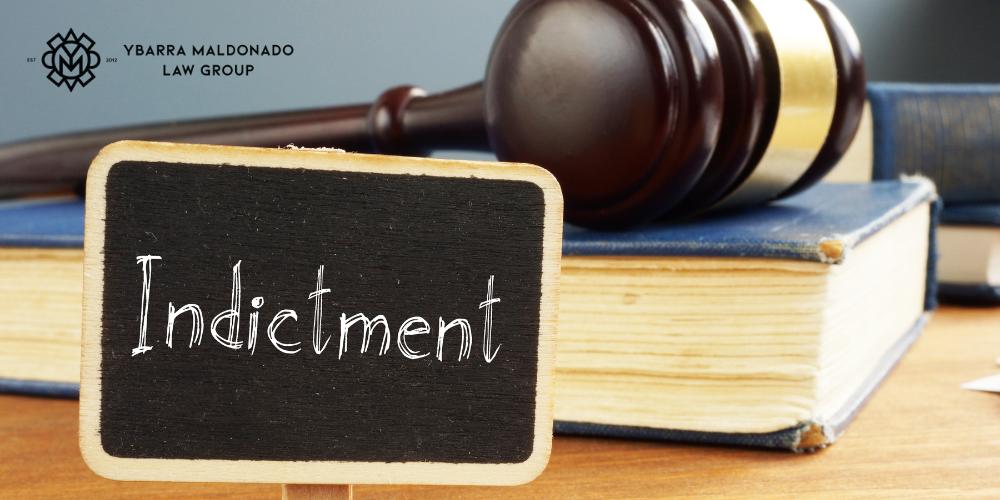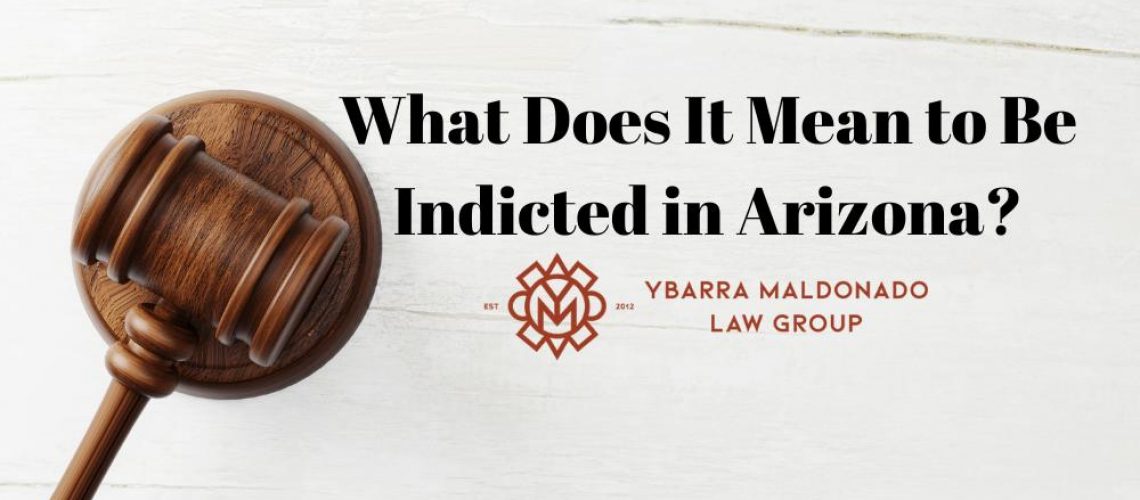When you find yourself facing criminal charges in the state of Arizona, one term you may encounter is “indictment.” But what does it mean to be indicted? Understanding its implications is crucial if you or a loved one is involved in a legal matter. At Ybarra Maldonado Law Group, we are committed to providing comprehensive legal guidance and defense strategies to those who have been indicted in Arizona.
In this blog post, we will break down what it means to get indicted in Arizona, discuss the differences between indictment and other legal terms, and help you understand the importance of legal representation during such a critical time. To schedule a consultation with an experienced criminal defense lawyer in Phoenix, call our office at 602-910-4040 today.
What Does It Mean to Get Indicted in Arizona?
An indictment is a formal accusation or charge of a serious crime. A grand jury or prosecutor issues an indictment in most cases, marking the beginning of a criminal case. If you have been indicted, it means that there is enough evidence to move forward with a criminal trial and potentially convict you of the alleged crime. Indictments can happen in a district court, state court, or federal court.
What Does “Indicted” Mean in a Criminal Trial?

To be “indicted” means that a formal accusation has been made against you, charging you with a specific crime. This accusation implies that the authorities have gathered sufficient evidence to warrant a trial. Essentially, the grand jury has decided there is probable cause to believe you have committed a crime.
Rule 7 of the Federal Rules of Criminal Procedure states that “The indictment must be a plain, concise, and definite written statement of the essential facts constituting the offense charged.” It is a prosecutor’s job to explain the facts of the crime allegedly committed by the accused person. With those facts, the grand jury will decide if there is enough evidence to indict the person and proceed to trial.
Indictment vs Complaint
An indictment and a criminal complaint are both legal documents used to charge individuals with crimes, but they differ in a few key ways.
Indictment: Typically, grand jury members issue an indictment. A grand jury is a group of citizens who review evidence presented by a prosecutor to determine if there is enough evidence to move forward with a trial. Indictments are commonly used for serious felony cases.
Complaint: A complaint is usually filed by a prosecutor without involving a grand jury. It is often used for less severe crimes, known as misdemeanors.
Indicted vs Arrested
Being indicted is distinct from being arrested. An arrest signifies that you are taken into custody by law enforcement based on probable cause or an arrest warrant. This is a lower legal standard than the evidence required for an indictment. After an arrest, you may be charged with a criminal offense. Then, the case proceeds to the indictment. Read our related blog to learn how to find out if you have a warrant in Arizona.
Indictment vs Charge
While both indictment and charging involve accusing someone of a crime, there are key differences.
Charge: Criminal charges are the initial step in the legal process. A charge is filed by the prosecutor, often after an arrest, and indicates that they believe there is enough evidence to proceed with the case.
Indictment: An indictment occurs after the charge. It involves a grand jury’s or prosecutor’s formal decision to proceed with the case. An indictment carries more significant legal weight.
Indictment vs Conviction
An indictment is not the same as a conviction. Grand juries issue indictments, while petit juries issue convictions in both criminal and civil cases.
Indictment: As mentioned earlier, an indictment is an accusation or charge. It does not imply guilt but suggests that there is enough evidence to warrant a trial.
Conviction: A conviction occurs when a court finds an individual guilty of a crime beyond a reasonable doubt. This usually comes after a trial or plea bargain.
Does Indictment Mean Jail Time?

An indictment itself does not guarantee jail time. It signifies that the legal process is moving forward, and you will have the opportunity to defend yourself against the accusations in a court of law. The case outcome, whether it leads to jail time or not, depends on various factors. These factors can include the strength of the evidence and the effectiveness of your legal defense.
If you are facing the indictment process, it is crucial to speak with a skilled defense attorney. Being formally accused of serious crimes can have serious consequences for your reputation.
What Is a Grand Jury Indictment?
A grand jury indictment is a formal charging document issued by a grand jury. Grand juries are made up of citizens who review evidence presented by a prosecutor. If the grand jury believes there is enough evidence to warrant a trial, they issue an indictment. They are common in serious felony cases.
What Types of Crimes Warrant a Grand Jury?
A criminal case that involves felony charges can warrant a grand jury. Serious crimes, such as the following, often involve indictments by grand jurors.
- Homicide
- White collar crimes
- Organized crime
- Any felony case
It’s important to note that the decision to use a grand jury varies by jurisdiction and case specifics.
What Does It Mean to Be Indicted by a Federal Grand Jury?
Being federally indicted means that you are facing charges at the federal level, as opposed to the state level. Federal crimes typically involve violations of federal laws, such as those related to immigration, drug trafficking, or crimes that cross state lines. The process for federal indictment is similar to state indictment, involving a federal grand jury in many cases.
Instead of a state prosecutor bringing formal charges against someone in these cases, a prosecutor for the federal government is likely to be involved.
Should I Get an Attorney if I’ve Been Indicted in Phoenix?

Absolutely, without question. If you have been indicted, it is essential to seek the immediate assistance of an experienced criminal defense attorney. The criminal justice system can feel intimidating to navigate, especially without legal representation.
An experienced defense attorney brings several benefits to the table, such as the following.
- Protection of your constitutional rights
- An in-depth understanding of the law and legal procedures. They can build a strong case and present evidence in your defense.
- Thorough case evaluations, identifying weaknesses in the prosecution’s case and potential strengths in your case
- Impressive negotiation skills, potentially reducing the charges against you
- Support throughout the stressful legal process of facing criminal charges
Contact a Phoenix Criminal Defense Attorney at Ybarra Maldonado Law Group
If you or a loved one has been indicted in Arizona, it’s crucial to have a skilled legal advocate by your side. At Ybarra Maldonado Law Group, our team of experienced criminal defense attorneys is committed to providing you with the highest level of legal representation. We understand the complexities of the legal system and will work tirelessly to protect your rights and build a strong defense.
To schedule a free case evaluation, please call our office at 602-910-4040 today.


